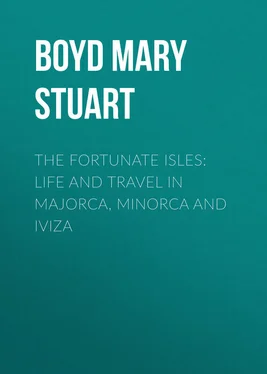Mary Boyd - The Fortunate Isles - Life and Travel in Majorca, Minorca and Iviza
Здесь есть возможность читать онлайн «Mary Boyd - The Fortunate Isles - Life and Travel in Majorca, Minorca and Iviza» — ознакомительный отрывок электронной книги совершенно бесплатно, а после прочтения отрывка купить полную версию. В некоторых случаях можно слушать аудио, скачать через торрент в формате fb2 и присутствует краткое содержание. ISBN: , Жанр: foreign_language, foreign_antique, foreign_prose, Путешествия и география, на английском языке. Описание произведения, (предисловие) а так же отзывы посетителей доступны на портале библиотеки ЛибКат.
- Название:The Fortunate Isles: Life and Travel in Majorca, Minorca and Iviza
- Автор:
- Жанр:
- Год:неизвестен
- ISBN:http://www.gutenberg.org/ebooks/39199
- Рейтинг книги:5 / 5. Голосов: 1
-
Избранное:Добавить в избранное
- Отзывы:
-
Ваша оценка:
- 100
- 1
- 2
- 3
- 4
- 5
The Fortunate Isles: Life and Travel in Majorca, Minorca and Iviza: краткое содержание, описание и аннотация
Предлагаем к чтению аннотацию, описание, краткое содержание или предисловие (зависит от того, что написал сам автор книги «The Fortunate Isles: Life and Travel in Majorca, Minorca and Iviza»). Если вы не нашли необходимую информацию о книге — напишите в комментариях, мы постараемся отыскать её.
The Fortunate Isles: Life and Travel in Majorca, Minorca and Iviza — читать онлайн ознакомительный отрывок
Ниже представлен текст книги, разбитый по страницам. Система сохранения места последней прочитанной страницы, позволяет с удобством читать онлайн бесплатно книгу «The Fortunate Isles: Life and Travel in Majorca, Minorca and Iviza», без необходимости каждый раз заново искать на чём Вы остановились. Поставьте закладку, и сможете в любой момент перейти на страницу, на которой закончили чтение.
Интервал:
Закладка:
The two sitting-rooms boasted the distinction of wall papers, and the ceiling of our favourite room – that which opened on to the veranda – represented an azure sky among whose fluffy white clouds flitted birds and butterflies. At one side of the house was a stable, and an enclosure fitted with stone tubs and jars, meant to be used in the washing of clothes.
The veranda, or terras , bade fair to become a perpetual joy to us. It was roofed by a spreading vine, whose foliage even in November was luxuriant. The former tenants had eaten all the grapes except one bunch, of which the wasps had taken possession; and we were either too generous or too timid to dispute their claim.
On the broad ledge of the veranda, on either side of the short flight of steps leading down to the garden, were great green flower-pots. Three held pink ivy-leaved geraniums, one contained a cactus that had exactly the appearance of four prickly sea-urchins set in mould, the others were empty.
The garden measured nineteen paces by twenty-two. Raised paths of concrete divided it into eight beds. The four larger encircled the quaint draw-well; the four smaller were in a row, two on either side of the veranda steps. The beds held a number of fruit trees. There was a sturdy lemon that bore both fruit and blossom, and three orange-trees; one carrying about sixty mandarin oranges. And besides a second vine there were seven almond-trees and two apricots. A shrub in whose racemes of hawthorn-scented blossom bees were busy, we had never before seen. Later we learned that it was the loquat.
Some rose bushes, which obligingly flowered all winter, a jasmine, a tall scented verbena, a long row of sweet peppers, two clumps of artichokes, and sundry tufts of herbs completed our vegetable kingdom.
Majorca is a paradise for the gardener – or would be, were the rainfall more assured – for the climate varies so little that almost anything can be planted at any season.
The day we took possession of the house I sowed some rows of dwarf peas. In a week they were above the ground and continued to flourish exceedingly, until brought to a standstill by the long-continued drought. The rain in January set them a-growing again, and from early February till April we had dishes of green peas from our own ground.
At the foot of the garden, separated from it by a high stone wall, were two small dwellings. One was empty. In the other there resided a cobbler named Pepe, his wife, and a lean red kitten.
The sudden arrival of us foreigners proved an event of extraordinary interest in the circumscribed lives of the pair, and of the skinny kitten, who developed into quite a handsome cat on our scraps. Mr. and Mrs. Pepe had no veranda, but from their patch of garden a tiny staircase led to a mirador – a species of roof watch-tower – from which they had a capital view of the town, the port, and of their neighbours.
As in these sunny November days we lived with the wide glass doors open to the veranda, there was so much to observe in our doings that for the first week at least of our stay Pepe's customers must have been neglected; for morning, noon, and night he was at his post of supervision. As we sat at table we got quite accustomed to seeing his squat figure outlined against the sky as he undisguisedly watched our movements. Sometimes he even carried his quaint spouted wine-bottle and hunk of rye bread up to the mirador , and enjoyed his breakfast with a vigilant eye on us.
Pepe had a taste for gardening, and grew chrysanthemums and carnations in the few feet of soil attached to his dwelling. Sometimes, with due ceremonial, he presented us with one of his striped carnations. And one day, when I was in the garden, he hastened down from his post of observation to reappear, smiling broadly, at our side gate, bearing the gift of a sturdy root of French marigold. We showed our appreciation of the compliment by sending him a boot to mend; and, courteous preliminaries having been thus exchanged, we continued to live on terms of distant amity. The marigold I promptly planted in one of the empty green flower-pots, where throughout the winter it bore a constant succession of its brown and orange velvet flowers.
A family from Andalusia – a father, mother, and four children – occupied the house adjoining ours. They seemed good-tempered, easy-going folks, living a happy careless life in this land of sunshine. Their somewhat extensive garden was well kept and fruitful.
The father, like so many of the residents in these islands, was a bird-fancier. And when, on sunny mornings, assisted by his children, he had carried out the dozens of cages containing his pets, and had hung them on his pomegranate-trees, and on the pergola, where the purple convolvulus twined about branches heavy with golden oranges, our world was vocal with their song.
At the foot of their garden was a flourishing little poultry-yard, in which, with laudable success, they reared chickens and ducks and rabbits. They supplied us regularly with eggs, and when any of the live stock was ripe for the pot we always had the first offer of purchase.
The method of procedure was to catch the beast – plump rabbit, young rooster, or whatever it chanced to be – and to carry it, suspended by the legs and vigorously protesting, to the door of our casa to exhibit its proportions, and to inquire if we would like to purchase. On the sale being effected, as it usually was, for the quality of their live stock was unequalled, the victim would be taken away, to reappear half an hour later stripped of fur or feather, and with its members decorously dressed for cooking.
Early in the year the Andalusian family was increased by one – a fine boy. A few weeks after, the mother paid me a state visit to receive congratulations and exhibit the baby. Going into the studio, I said:
"Our neighbour has brought her new baby to show us."
The Man waved me away with a protesting paint-brush.
"No," he said. "Don't buy it. Send her away. I don't mind the ducks and the chickens, but I absolutely refuse to eat the baby!"
Life in the Casa Tranquila, as we had christened our winter home, was a pleasant irresponsible matter compared with existence in ceremonial Britain. Social pleasures we undoubtedly had, but no social duties. Housekeeping ran on the simplest of lines. Maria, the woman who had been key-keeper of the house while it was empty, came in to do the rough work. Apolonia, a smiling, rubicund old dame, with a keen sense of humour, acted as laundress. It was all so easy and unconventional and open-airy that we never quite got over the impression that we were enjoying a prolonged camping-out, and that it was by accident that our roof was of tiles and not of canvas.
Our morning began with the arrival of a baker who brought the bread, rolls, and enciamadas for the day's consumption. We did not use the milk of goats, though, twice daily, a little flock, with tinkling bells, their udders tied up in neat bags of check cotton for protection against the unauthorised raids of their thirsty kids, was driven past our door to be milked before the eyes of each customer. A sprightly matron served us morning and evening with the milk of a cow, which her husband spent his days herding on any stray patches of herbage in the district.
Each day at noon, Mundo, the greengrocer, called with a donkey-cart containing quite a comprehensive assortment of fruit and vegetables. Three kinds of potatoes he always brought – new, old, and sweet – pumpkins that were sold in slices, egg-plants, garlic strung in long festoons, spinach, cauliflowers, sweet peppers, curious fungi, purple carrots, sugar beans; all at astonishingly low prices. I shall always remember the November day when, in a moment of forgetfulness, I asked for a whole pennyworth of tomatoes, and was afterwards confronted by the difficulty of disposing of so many.
Читать дальшеИнтервал:
Закладка:
Похожие книги на «The Fortunate Isles: Life and Travel in Majorca, Minorca and Iviza»
Представляем Вашему вниманию похожие книги на «The Fortunate Isles: Life and Travel in Majorca, Minorca and Iviza» списком для выбора. Мы отобрали схожую по названию и смыслу литературу в надежде предоставить читателям больше вариантов отыскать новые, интересные, ещё непрочитанные произведения.
Обсуждение, отзывы о книге «The Fortunate Isles: Life and Travel in Majorca, Minorca and Iviza» и просто собственные мнения читателей. Оставьте ваши комментарии, напишите, что Вы думаете о произведении, его смысле или главных героях. Укажите что конкретно понравилось, а что нет, и почему Вы так считаете.











![John Bruce - The Lettsomian Lectures on Diseases and Disorders of the Heart and Arteries in Middle and Advanced Life [1900-1901]](/books/749387/john-bruce-the-lettsomian-lectures-on-diseases-and-disorders-of-the-heart-and-arteries-in-middle-and-advanced-life-1900-1901-thumb.webp)
